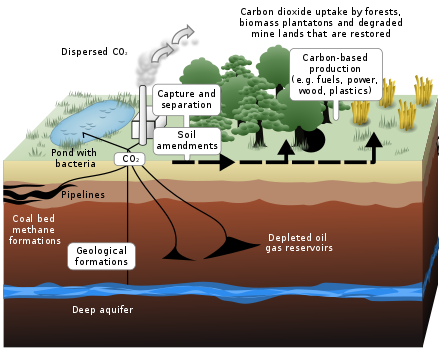Environment Notes On – Carbon Capture – For W.B.C.S. Examination.
Amongst the vast syllabus of W.B.C.S Examination, this part is quite easy to read and recollect and also fetches good marks.Biological diversity, or biodiversity, is the scientific term for the variety of life on Earth. It refers not just to species but also to ecosystems and differences in genes within a single species. Biodiversity is the key indicator of the health of an ecosystem.Carbon dioxide capture and storage (CCS) is the process by which carbon dioxide emissions from power plants and other industrial facilities are captured and stored underground.Continue Reading Environment Notes On – Carbon Capture – For W.B.C.S. Examination.
The process is currently being demonstrated worldwide at commercial scales, but without more experience, the role of CCS in meeting future climate goals will remain uncertain—especially in emerging economies. Without supportive policies and engaged local communities, CCS technologies will be unable to assume a central role in climate change mitigation.
WRI’s work on CCS has been prefaced by five guiding principles. CCS should not be deployed unless we can:
- Protect human health and safety
- Protect ecosystems
- Protect underground sources of drinking water and other natural resources
- Ensure market confidence in emissions reduction through greenhouse gas accounting
- Facilitate cost-effective, timely deployment
In an effort to ensure present and future CCS projects around the world are as environmentally and socially responsible as possible, WRI leads an international collaboration within the US- China Clean Energy Research Center (CERC) Advanced Coal Technology Consortium and works to provide technical expertise on the regulations and policies required for safe and effective CCS deployment, primarily in the US and China. WRI is also working with CCS project developers to find ways to share knowledge from past projects and accelerate the CCS learning curve.Do follow previous years question papers for better understanding of the types of questions asked.
Carbon sequestration, the long-term storage of carbon in plants, soils, geologic formations, and the ocean. Carbon sequestration occurs both naturally and as a result of anthropogenic activities and typically refers to the storage of carbon that has the immediate potential to become carbon dioxide gas. In response to growing concerns about climate change resulting from increased carbon dioxide concentrations in the atmosphere, considerable interest has been drawn to the possibility of increasing the rate of carbon sequestration through changes in land use and forestry and also through geoengineering techniques such as carbon capture and storage.
Some policy makers, engineers, and scientists seeking to mitigate global warming have proposed new technologies of carbon sequestration. These technologies include a geoengineering proposal called carbon capture and storage (CCS). In CCS processes, carbon dioxide is first separated from other gases contained in industrial emissions. It is then compressed and transported to a location that is isolated from the atmosphere for long-term storage. Suitable storage locations might include geologic formations such as deep saline formations (sedimentary rocks whose pore spaces are saturated with water containing high concentrations of dissolved salts), depleted oil and gas reservoirs, or the deep ocean. Although CCS typically refers to the capture of carbon dioxide directly at the source of emission before it can be released into the atmosphere, it may also include techniques such as the use of scrubbing towers and “artificial trees” to remove carbon dioxide from the surrounding air.
Please subscribe here to get all future updates on this post/page/category/website


 Toll Free 1800 572 9282
Toll Free 1800 572 9282  mailus@wbcsmadeeasy.in
mailus@wbcsmadeeasy.in



















































































































